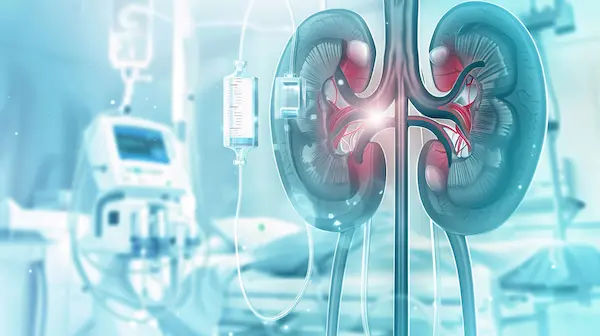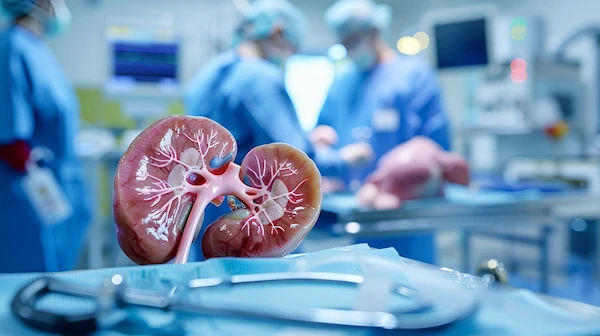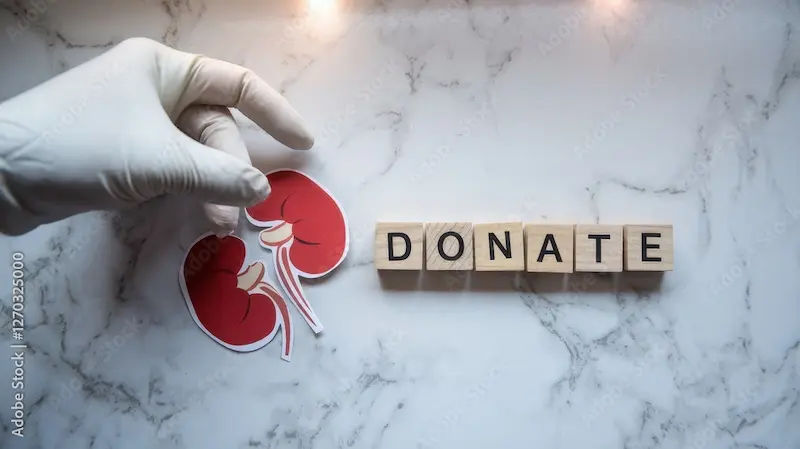Kidney Transplant: When It Is Needed & What to Expect
Learn when a kidney transplant is necessary, the eligibility criteria, evaluation process, and what to expect before and after surgery to improve quality of life for patients with end-stage renal disease.

Written by Dr. Dhankecha Mayank Dineshbhai
Reviewed by Dr. M L Ezhilarasan MBBS
Last updated on 13th Jan, 2026
.webp?tr=q-80,f-webp,w-350,dpr-2,c-at_max 700w)
Introduction
Chronic kidney disease is a silent epidemic, often progressing unnoticed until function is significantly impaired. When the kidneys can no longer support the body's needs, patients and their families face critical decisions about their future care. This guide delves into one of the most effective treatments for end-stage renal failure: a kidney transplant. We will explore the precise medical indicators that signal when a transplant is necessary, moving beyond simple definitions to understand the real-world journey. Whether you're evaluating options for yourself or a loved one, this article will provide a comprehensive overview of the eligibility criteria, the process, and the life-changing benefits and commitments of receiving a new kidney. Our goal is to empower you with knowledge for informed discussions with your healthcare team.
Understanding Kidney Failure: The Root Cause
Kidney failure, or end-stage renal disease (ESRD), doesn't happen overnight. It's the culmination of a gradual loss of kidney function, typically over months or years. The kidneys' primary role is to filter waste and excess fluid from the blood, which is then excreted as urine. When they fail, toxic levels of fluid and waste can accumulate, leading to a life-threatening situation. Understanding the common pathways to ESRD is the first step in identifying who might eventually need a kidney transplant.
What is End-Stage Renal Disease (ESRD)?
ESRD is the fifth and final stage of chronic kidney disease (CKD), where the kidneys are functioning at less than 15% of their normal capacity. At this point, the body can no longer maintain its internal balance, and renal replacement therapy—either dialysis or a transplant—becomes essential for survival. A key metric doctors use is the glomerular filtration rate (GFR), which measures how well the kidneys are filtering blood. A GFR below 15 mL/min indicates ESRD.
Common Conditions Leading to ESRD
Several chronic conditions can damage the nephrons, the kidneys' tiny filtering units, leading to ESRD.
Diabetes Mellitus: The Leading Cause
Diabetes is responsible for nearly 40-50% of all ESRD cases. Consistently high blood sugar levels over time damage blood vessels throughout the body, including the delicate ones in the kidneys. This impairs their filtering ability, a condition known as diabetic nephropathy. Managing diabetes effectively is the single most important preventative measure against reaching the point where a transplant is needed.
High Blood Pressure (Hypertension)
Uncontrolled high blood pressure is the second leading cause of ESRD. Hypertension forces the heart to work harder and can damage blood vessels in the kidneys, reducing their efficiency. Like diabetes, it’s a silent contributor, often causing significant damage before any symptoms of kidney impairment appear.
Glomerulonephritis
This is a group of diseases that cause inflammation and damage to the kidney's filtering units (glomeruli). It can be caused by infections, autoimmune disorders like lupus, or other conditions that may suddenly appear (acute) or develop slowly (chronic).
Polycystic Kidney Disease (PKD)
PKD is a common inherited genetic disorder characterised by the growth of numerous cysts in the kidneys. These cysts slowly replace much of the normal kidney tissue, leading to a progressive decline in function and often resulting in ESRD.
Consult a Specialist for the best advice
Is a Kidney Transplant Right for You? The Key Criteria
Not everyone with ESRD is an immediate candidate for a transplant. The process involves a major surgery and a lifetime of medication, so medical teams conduct a rigorous evaluation to ensure the highest chance of success and the lowest risk of complications.
Medical Eligibility for Transplant Surgery
The ideal candidate is someone whose kidney disease has progressed to the point of needing, or soon needing, dialysis. However, they must also be healthy enough to withstand the major surgery and the effects of lifelong immunosuppressive drugs. Key factors include:
- A thorough cardiac workup to ensure the heart can handle the stress of surgery.
- Cancer screenings, as immunosuppressants can increase the risk of certain cancers.
- Tests for active infections, which must be treated before transplantation.
The Importance of Overall Health and Lifestyle
Beyond specific medical tests, the transplant team assesses a patient's overall health and psychosocial readiness. This includes:
- Nutritional Status: Being at a healthy weight improves outcomes.
- Substance Use: Most programs require candidates to be free from tobacco, alcohol, and illicit drug use for a period of time.
- Mental Health: A strong support system and demonstrated ability to adhere to a complex medication schedule are crucial.
The Transplant Evaluation Process: A Thorough Assessment
The evaluation is a multi-day, multi-disciplinary process. You will meet with transplant surgeons, nephrologists, nurse coordinators, social workers, and financial coordinators. They will run a battery of tests, including blood work (for tissue typing and crossmatching), imaging scans, and chest X-rays. This exhaustive process is designed not to exclude people unnecessarily, but to create a complete health picture and ensure a kidney transplant offers the best path forward. If your nephrologist recommends an evaluation, consulting a specialist through Apollo24|7 can be a convenient first step to discuss the process and your suitability.
The Tipping Point: Signs You May Need a Transplant
The decision to pursue a transplant is often made in collaboration with your nephrologist. There are several clear indicators that this option should be actively considered.
When Dialysis Becomes Necessary
The most straightforward sign is the onset of ESRD requiring dialysis. While dialysis is a life-sustaining treatment, it is also physically demanding and time-consuming. Being on dialysis is, in itself, a primary reason to be evaluated for a transplant. In fact, receiving a transplant before ever needing dialysis (a pre-emptive transplant) is often associated with the best long-term outcomes.
Declining Quality of Life on Dialysis
For many already on dialysis, the decision to seek a transplant is driven by a desire to regain freedom and improve their quality of life. The rigorous schedule of dialysis sessions (often 3-4 times a week for 3-4 hours each) can make working, traveling, and socialising extremely difficult. If the constraints of dialysis are significantly impacting your mental and physical well-being, it is a strong signal to discuss transplant eligibility with your doctor.
Pediatric Kidney Failure: Special Considerations for Children
For children with ESRD, a kidney transplant is almost always the preferred treatment. Dialysis can interfere with a child's growth, development, school attendance, and social integration. A successful transplant allows a child to grow more normally, have a more regular diet, and enjoy a much more typical childhood. The evaluation process for children is specialised, considering their unique developmental needs.
Weighing Your Options: Transplant vs. Dialysis
This is a fundamental decision in managing ESRD. Understanding the pros and cons of each is vital.
Long-Term Benefits of a Successful Kidney Transplant
A successful transplant offers a significantly better quality of life and survival rate compared to long-term dialysis.
- Increased Life Expectancy: Transplant recipients generally live longer than those who remain on dialysis.
- Better Quality of Life: Freedom from a dialysis machine allows for more energy, a less restrictive diet, greater ability to work and travel, and often improved overall well-being.
- More Effective Filtration: A healthy transplanted kidney filters waste more effectively than dialysis, which can lead to better overall health.
Understanding the Risks and Challenges
A transplant is not a cure; it's a trade of one chronic condition (ESRD) for another (managing a transplant).
- Surgical Risks: As with any major surgery, there are risks of bleeding, infection, and blood clots.
- Organ Rejection: The body's immune system may see the new kidney as foreign and attack it. This requires lifelong immunosuppressant drugs to prevent.
- Side Effects of Medications: Immunosuppressants can cause weight gain, high blood pressure, diabetes, and increase the risk of infections and certain cancers.
- No Guarantee: A transplanted kidney may last 15-20 years or more, but it may eventually fail, potentially requiring a return to dialysis or another transplant.
Conclusion
The decision to pursue a kidney transplant is one of the most significant a person facing ESRD will make. It represents a hope for renewed health and freedom, but also a commitment to a lifetime of vigilant self-care and medical management. Understanding the precise indicators—from a formal ESRD diagnosis to a declining quality of life on dialysis—empowers you to have proactive, informed conversations with your healthcare team. While the path is demanding, the reward of a successful transplant is a chance at a longer, fuller, and more vibrant life. If you or a loved one are approaching this crossroads, remember you are not alone. Leverage the expertise of medical professionals to guide you through each step of the evaluation and decision-making process. For a personalised consultation to discuss your kidney health and treatment options, you can easily book an appointment with a nephrologist online through Apollo24|7.
Consult a Specialist for the best advice
Consult a Specialist for the best advice
Dr Gayatri Pegu
Nephrologist
15 Years • MD (General Medicine) DM(Nephrology)
Guwahati
Apollo Clinic Guwahati, Assam, Guwahati
Dr Ch Sashidhar
Nephrologist
20 Years • MBBS, MD General Medicine, DNB, Nephrology
Secunderabad
Apollo Hospitals Secunderabad, Secunderabad

Dr. Pardha Saradhi
Nephrologist
9 Years • MBBS, MD-DNB (Gen. Med.), DNB (Nephro)
Hyderabad
Apollo Hospitals D R D O kanchanbagh, Hyderabad
(75+ Patients)

Dr Praveen Kumar Etta
Nephrologist
10 Years • MBBS,MD DM(SGPGI) FORMER ASST(PIMS)
Hyderabad
Apollo Spectra Ameerpet, Hyderabad

Dr. Manju Kamal
Nephrologist
12 Years • MBBS,MD(General Medicine), DNB,DM(Nephrology)
Angamaly
Apollo Hospitals Karukutty, Angamaly
Consult a Specialist for the best advice
Dr Gayatri Pegu
Nephrologist
15 Years • MD (General Medicine) DM(Nephrology)
Guwahati
Apollo Clinic Guwahati, Assam, Guwahati
Dr Ch Sashidhar
Nephrologist
20 Years • MBBS, MD General Medicine, DNB, Nephrology
Secunderabad
Apollo Hospitals Secunderabad, Secunderabad

Dr. Pardha Saradhi
Nephrologist
9 Years • MBBS, MD-DNB (Gen. Med.), DNB (Nephro)
Hyderabad
Apollo Hospitals D R D O kanchanbagh, Hyderabad
(75+ Patients)

Dr Praveen Kumar Etta
Nephrologist
10 Years • MBBS,MD DM(SGPGI) FORMER ASST(PIMS)
Hyderabad
Apollo Spectra Ameerpet, Hyderabad

Dr. Manju Kamal
Nephrologist
12 Years • MBBS,MD(General Medicine), DNB,DM(Nephrology)
Angamaly
Apollo Hospitals Karukutty, Angamaly
More articles from Kidney Failure
Frequently Asked Questions
What is the average life expectancy after a kidney transplant?
While individual results vary, a successful kidney transplant from a living donor typically lasts 15-20 years on average, and from a deceased donor, 10-15 years. Many recipients live much longer, and the transplant often significantly increases life expectancy compared to remaining on dialysis.
How long is the kidney transplant waiting list?
The wait time can vary dramatically based on blood type, health status, and geographic location. On average, patients in many regions can wait 3-5 years for a deceased donor kidney. This is why finding a living donor is highly encouraged.
Can a family member always donate a kidney?
Not always. While family members are often the first to be tested for compatibility, they must be in excellent health, have a compatible blood type, and undergo a rigorous psychological and physical evaluation to ensure they are a suitable match and can donate safely.
What are the first signs of kidney rejection?
Early signs can be subtle and are often detected through routine blood tests (like a rising creatinine level) before symptoms appear. Symptoms can include flu-like feelings (fever, chills, aches), swelling or tenderness over the transplant site, weight gain, and a decrease in urine output. Immediate medical attention is crucial.
How much does a kidney transplant cost?
The cost is significant, often ranging from several lakhs to over ₹10 lakhs in India, depending on the hospital and complexity. This typically includes pre-transplant evaluation, the surgery itself, hospital stay, and initial medications. Most importantly, patients should consult with their transplant center's financial coordinator to understand insurance coverage and potential financial assistance programs.




